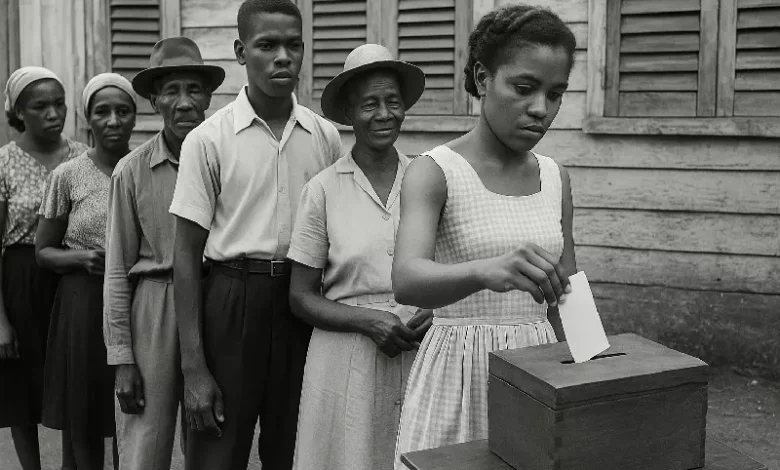Universal Adult Suffrage in Dominica

Universal adult suffrage in Dominica was introduced in 1951, marking a significant milestone in the island’s political development. This landmark development extended the right to vote to all Dominican adults, regardless of property ownership, income, gender, or social status, and played a critical role in shaping Dominica’s path toward self-government and eventual independence.
The Struggle for Political Inclusion
Before 1951, voting rights in Dominica were restricted by property and income qualifications, effectively limiting participation to a small elite. Under the colonial system, the vast majority of Dominicans, especially the working class and rural populations, were excluded from political decision-making.
Political activism during the 1940s, led by emerging leaders and organisations like the Dominica Labour Party (DLP) and the Dominica Civil Service Association, placed increasing pressure on the colonial administration to expand the franchise. Inspired by broader decolonisation movements across the Caribbean and beyond, Dominicans demanded more inclusive governance structures.
The successful implementation of universal adult suffrage was a direct result of sustained local advocacy, coupled with post-World War II global shifts in attitudes toward colonialism and human rights.
Key Changes Introduced by Universal Suffrage
The introduction of universal adult suffrage brought immediate and profound changes to Dominica’s political system:
- All Dominican adults aged 21 and older gained the right to vote without property or literacy restrictions.
- Women were enfranchised, becoming a powerful new voting bloc in national politics.
- Elections became more representative of the population’s accurate demographics, reflecting the needs of rural farmers, labourers, and small entrepreneurs.
This reform energised political life in Dominica, encouraging broader civic participation and making the island’s governance structures more democratic.
The 1951 General Elections: A New Era
Dominica’s first general elections under universal adult suffrage were held in 1951. The results dramatically reshaped the Legislative Council of Dominica, ushering in a new generation of political leaders who genuinely represented the masses.
Although the Legislative Council still included appointed colonial officials, the voice of the electorate became significantly louder. Political figures like Edward Oliver LeBlanc, who would later become Premier of Dominica, rose to prominence by advocating for the rural poor and championing social reform.
Broader Impacts on Dominican Society
The effects of universal adult suffrage extended far beyond election day:
- Political Mobilisation: Citizens became more engaged in politics, leading to the growth of mass-based political parties.
- Social Reform: New leaders advocated for education, healthcare, land reform, and workers’ rights, addressing long-ignored societal needs.
- Nation Building: A stronger sense of national identity and civic responsibility emerged, fueling Dominica’s eventual move toward becoming an Associated State of the United Kingdom in 1967 and complete independence in 1978.
Women’s Political Participation
Universal suffrage opened new avenues for women in Dominican public life. Women not only gained voting rights but also began participating more actively in political organisations and advocacy efforts, laying the groundwork for future female political leaders and movements.
Expansion of Educational and Civic Institutions
With a more representative electorate, the post-suffrage period saw significant investment in public education, community development projects, and rural healthcare. Political leaders recognised that a more informed and healthier citizenry would strengthen democracy.
Legacy of Universal Adult Suffrage in Dominica
Today, universal adult suffrage remains a pillar of Dominica’s democratic system. The reform helped dismantle colonial-era structures of privilege and exclusion, replacing them with institutions that better reflect the values of equality, representation, and participatory governance.
Dominica’s peaceful transition to independence, the resilience of its electoral system, and the vibrancy of its political culture all owe a significant debt to the transformative impact of universal suffrage.




